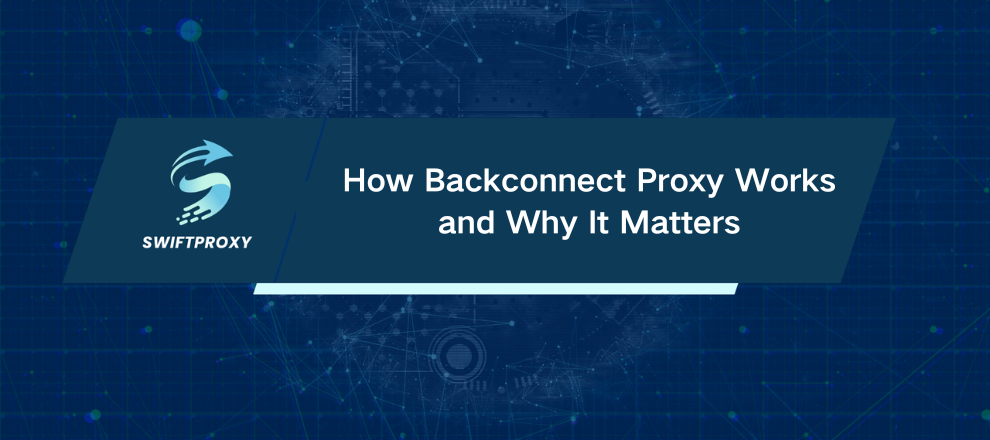How Backconnect Proxy Works and Why It Matters

Imagine trying to scrape data from dozens of websites in a short time. What happens? Most websites block your IP, locking you out and forcing you to start over. This is where backconnect proxies come in, offering a stealthy solution to bypass these roadblocks and ensuring smooth, uninterrupted access to the web.
Understanding Backconnect Proxy
Backconnect proxies—also known as rotating proxies—are unique because they don't just give you a single IP. Instead, they automatically rotate between hundreds or even thousands of IP addresses every time you make a request. So, whether you're conducting research, scraping data, or browsing anonymously, these proxies work behind the scenes to keep you undetected.
Unlike traditional proxies, which assign a static IP for the entire session, backconnect proxies continuously change your IP address with every new connection. This dynamic rotation gives you the flexibility to perform high-volume tasks without triggering website blocks or bans.
The Power of IP Rotation
When you use a backconnect proxy, your connection requests are routed through a dynamic pool of IP addresses. Here's how it works:
Connect to Proxy Service: You connect to the service, either via a dedicated app or through network settings.
Automatic IP Assignment: Each time you make a request, the proxy service assigns a random IP from its pool. This can be based on server load, geography, or sheer randomness.
IP Rotation: After a set time or number of requests, your IP rotates—keeping you anonymous and ensuring you're not flagged.
Load Balancing: Many services balance requests across multiple servers, optimizing performance and preventing any one server from getting overloaded.
Enhanced Security: With rotation, your online activities are harder to trace, adding an extra layer of privacy and security.
Advantages and Disadvantages of Backconnect Proxies
Backconnect proxies offer several advantages, but like anything, they come with trade-offs. Here's a breakdown:
Advantages:
Anonymity Boost: By rotating IP addresses, these proxies make it nearly impossible for websites to track or blacklist you. Perfect for those in privacy-sensitive fields.
Bypass IP Restrictions: Websites often block specific IPs. With backconnect proxies, you can easily get around these restrictions by switching IPs regularly.
Load Balancing: Distributed requests mean your proxy isn't overburdened, ensuring faster, smoother performance.
Scalable: Need more IPs for bigger projects? Backconnect proxies can scale up or down based on your needs.
Disadvantages:
Costly: The benefits come at a price. These proxies tend to be more expensive than traditional, static proxies.
Performance Lag: The rotation process can sometimes introduce slight delays, especially if there's heavy traffic or server congestion.
Reliability Risks: If the proxy provider experiences downtime, your connection could suffer. You're depending on them to manage the rotation and uptime.
Detection Risks: Despite the rotation, sophisticated websites may still detect proxy traffic. They've gotten good at spotting patterns.
How and When to Use Backconnect Proxies
Backconnect proxies aren't just for anyone. They're used for specific tasks that require the anonymity and flexibility these proxies offer. Here are a few common scenarios:
Web Scraping and Data Mining: If you need to gather data from multiple websites without getting blocked, these proxies help you gather large amounts of data without triggering bans.
SEO Monitoring: Keep an eye on search engine rankings or competitor activities without risking penalties from search engines.
Ad Verification: Backconnect proxies help advertisers check if their ads are being displayed correctly, and if competitors are running similar campaigns.
E-Commerce Price Scraping: Want to monitor competitor pricing? A rotating proxy ensures you can check various websites without getting caught.
Social Media Management: Manage multiple accounts without triggering suspicious activity flags. These proxies keep you under the radar.
Backconnect Proxies vs. Rotating Proxies
While often used interchangeably, backconnect proxies and rotating proxies have slight differences:
Rotating Proxies: Typically rotate IPs at fixed intervals or after a set number of requests. They're useful for smaller tasks but don't provide the same level of load balancing or redundancy as backconnect proxies.
Backconnect Proxies: Offer more advanced features like automatic failover, redundancy, and intelligent routing of requests. They're a more robust solution for businesses or users with high-volume needs.
Choosing the Right Proxy for Your Needs
Not all proxies are created equal. Backconnect proxies are the go-to for large-scale projects or privacy-focused tasks. But if you're just scraping a handful of websites or doing casual browsing, rotating proxies might be enough.
When evaluating your proxy needs, consider:
How much traffic you'll generate.
Whether you need consistent access or occasional anonymity.
Your budget—more advanced features come at a cost.
Ultimately, backconnect proxies provide a high-performance, secure, and scalable solution to handle sensitive tasks in a way that traditional proxies simply can't match.
Final Thoughts
Backconnect proxies aren't just about avoiding blocks. They're about working smarter in a web that's constantly tightening its defenses. Whether you're scraping at scale, monitoring markets, or managing multiple identities, these proxies give you the agility and anonymity to move freely. They come with a cost, and for high-impact tasks, the trade-off is often worth it. In the end, it's not just about getting access. It's about staying ahead.

















































